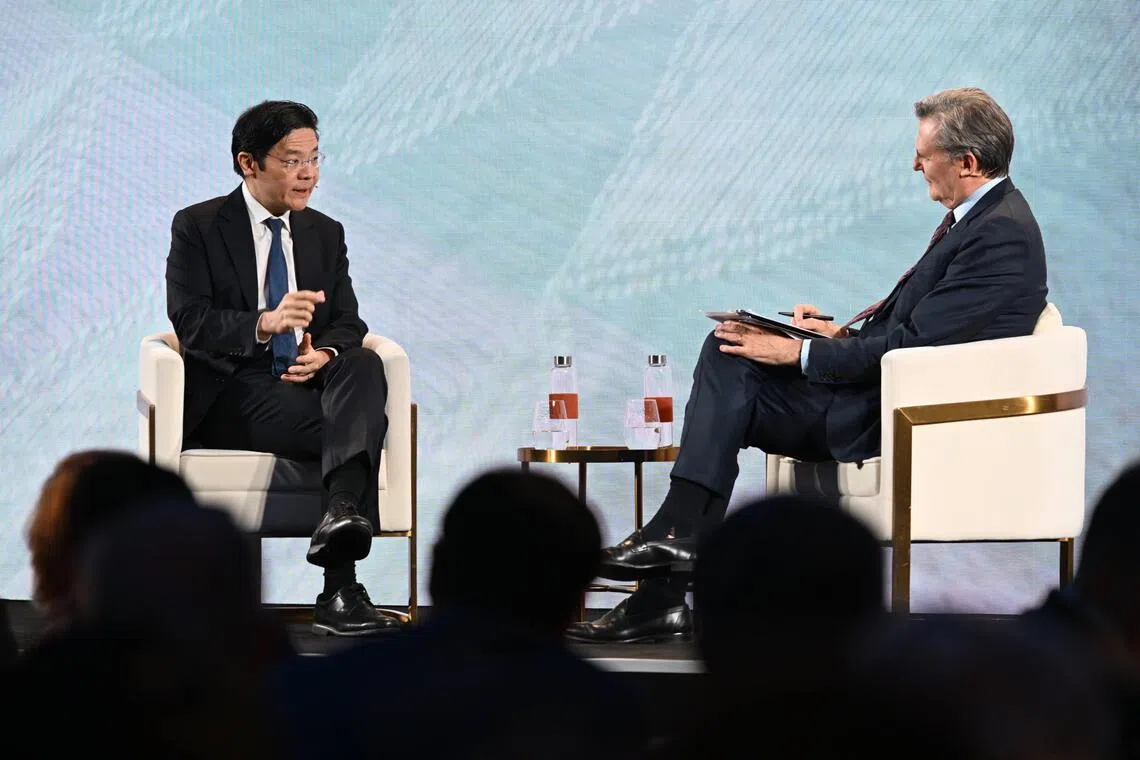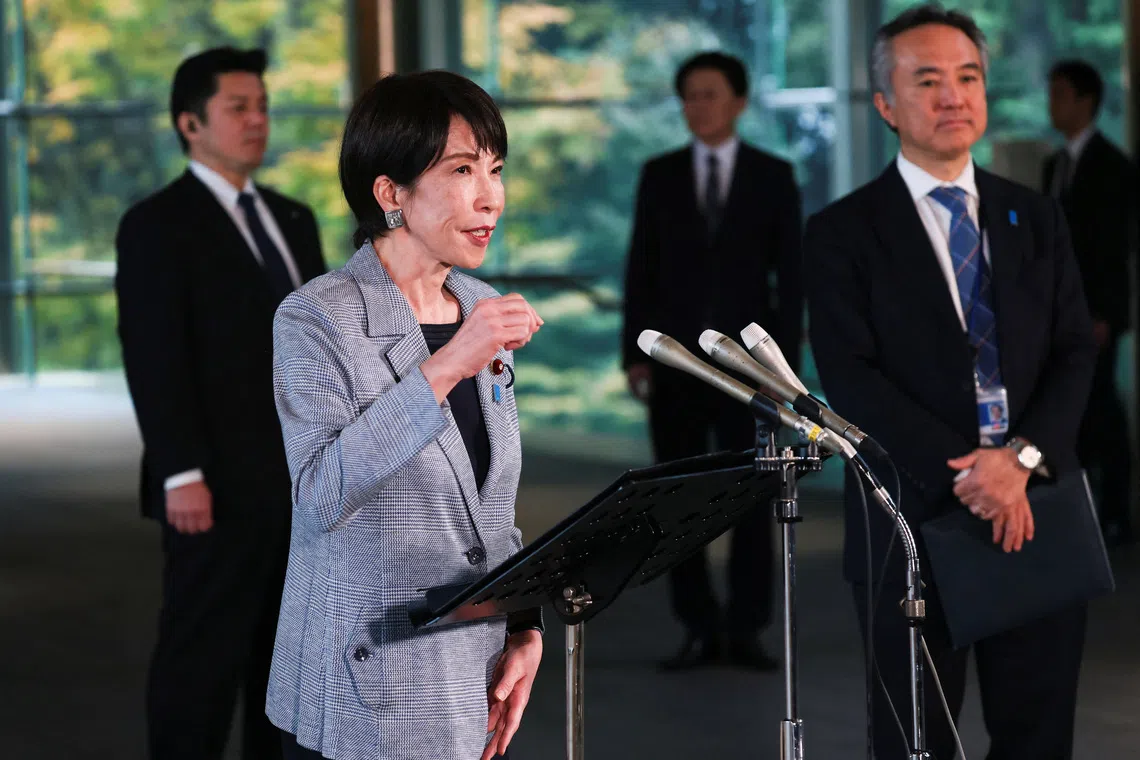News analysis
Barbs, jibes and spin by Chinese netizens over PM Wong’s remarks on Japan-China spat
Sign up now: Get insights on Asia's fast-moving developments

PM Lawrence Wong was asked about the China-Japan spat during the Bloomberg New Economy Forum in Singapore on Nov 19.
ST PHOTO: CHONG JUN LIANG
Follow topic:
BEIJING/HONG KONG – It started in Hong Kong, and then others in mainland China began jumping on the bandwagon.
Over the past week, barbs and jibes in the Chinese online space clustered over Singapore Prime Minister Lawrence Wong’s recent remarks on a China-Japan dispute over Taiwan
Anti-Singapore sentiment sparked by the island-state’s foreign policy stance is not new. Previous episodes range from a major online influence and disinformation campaign over the Terrex incident in 2016, a major diplomatic incident between Singapore and China when Hong Kong Customs seized Singapore’s military vehicles, to a more recent kerfuffle over Singapore’s identification of a cyber espionage group
But the current maelstrom is notable for the mix of voices seeking to give their own negative spin on PM Wong’s words, ranging from a Hong Kong news portal with a track record of echoing pro-Beijing and nationalistic sentiments, to commercially driven Chinese content creators who rely on online traffic for revenue.
The hostilities tap into chauvinistic sentiments in China that are now surging high, fuelled by propaganda reports that target Japan.
The testy environment in East Asia emerged in the wake of Nov 7 comments by Japan’s Prime Minister Sanae Takaichi, which Beijing took umbrage at
Beijing denounced this as interference in its “internal affairs”, responding with a firestorm of travel advisories, trade embargoes and military posturing.
Asked subsequently about the bilateral spat during the Bloomberg New Economy Forum in Singapore on Nov 19, PM Wong said that it is in everyone’s interest for there to be stability in Asia, and that he hoped both countries will find ways to de-escalate.
He also noted the “overhang of the history of World War II, which still remains between the two countries”.
“We hope the two countries will find ways to resolve these very complex issues and move forward. South-east Asia has done that with Japan. It has taken some time, but with the passage of time, with the passing of generations, the feelings are not the same, and we have put the history aside. And we are moving forward.”
The controversy touches on World War II history, which many ordinary Chinese feel strongly about. China views Japan as not having sufficiently apologised for its past atrocities committed during the war.

The testy environment in East Asia emerged in the wake of Nov 7 comments by Japan’s Prime Minister Sanae Takaichi, which Beijing took umbrage at.
.PHOTO: REUTERS
Smaller media outlets in Hong Kong were among the first to jump in on PM Wong’s statement.
Several, such as am730 and on.cc, ran almost identical headlines highlighting that PM Wong had “hinted” for China to “drop its historical prejudices”.
Among the city’s larger news platforms, HK01 – a site set up in 2016 by Beijing loyalist Yu Pun-hoi, a former chairman of Hong Kong newspaper Ming Pao – published five articles over the past six days focused on PM Wong’s comments. All but one of the pieces were commentaries or analyses.
“Singapore’s obvious bias in the China-Japan spat is discomfiting,” read a Nov 24 article on HK01 that was syndicated from Guancha.cn, an ultra-nationalistic news site based in Shanghai.
This came in tandem with a surge of videos and articles posted on Chinese social media, with mostly self-styled commentators offering their takes on PM Wong’s remarks.
Many had erroneously interpreted them as Singapore taking Japan’s side against China. Some who left comments referred to Singapore by the derogatory term “Po County”, which references a lower administrative level in China. Others fumed at what they saw as an insinuation for China to “let go of the past”.
Comments have run the gamut from “Singapore is a running dog of the United States” to “China has been too good to Singapore”.
On Nov 25, “Why Singapore dares to interfere in the Sino-Japanese dispute” briefly became the top trending topic on Weibo, China’s version of X.
Some level of orchestration and manufactured outrage appears likely, given the coordinated fashion in which some of the commentary emerged.
Another motivating factor could be self-interest, as content creators look to drive eyeballs to their platforms with ever-more virulent denunciations, after noticing that earlier attacks on PM Wong and Singapore were not taken down by the authorities in China’s highly regulated internet.
Other Chinese netizens expressed indignation over what they perceived as Singapore speaking on behalf of its neighbours.
At the forum, PM Wong had noted that surveys have found that Singapore and other South-east Asian countries support Japan playing a bigger role in the region.
“It is quite striking that survey after survey shows that Japan is the No. 1 trusted great power in South-east Asia,” he had said.
“And so Singapore and all the South-east Asian countries support Japan playing a bigger role in our region, including on the security front, because we think that provides for some stability in the region.”
The ISEAS – Yusof Ishak Institute’s flagship report, The State of South-east Asia
Mr Lye Liang Fook, an associate senior fellow at the institute, has studied Singapore-China relations. “Since the end of World War II, Japan has been an active contributor to the region’s growth and development. That is a fact. So I think (PM Wong) was coming from that perspective,” he told ST.
A reporter from the HK01 newsroom told The Straits Times on the condition of anonymity: “HK01’s editorial stance on international issues, in particular those related to China-US relations and Taiwan’s status, has always been stridently nationalistic and pro-Beijing.
“Such international news commentaries are typically more congruent with the broad sentiment in mainland China, and do not necessarily reflect the views and values of the Hong Kong people.”
State-affiliated media outlets such as the nationalistic tabloid Global Times and the main English-language daily, China Daily, often carry editorials or news articles quoting academics with views that are aligned with Beijing’s official position.
But what is notable is that official Chinese media outlets have not published reports on the online discontent, nor have reputed Chinese scholars weighed in on Singapore’s position.
So, despite the anti-Singapore sentiment that has been allowed to propagate in China’s highly regulated internet, there is little sign yet that Singapore-China relations will be affected.

